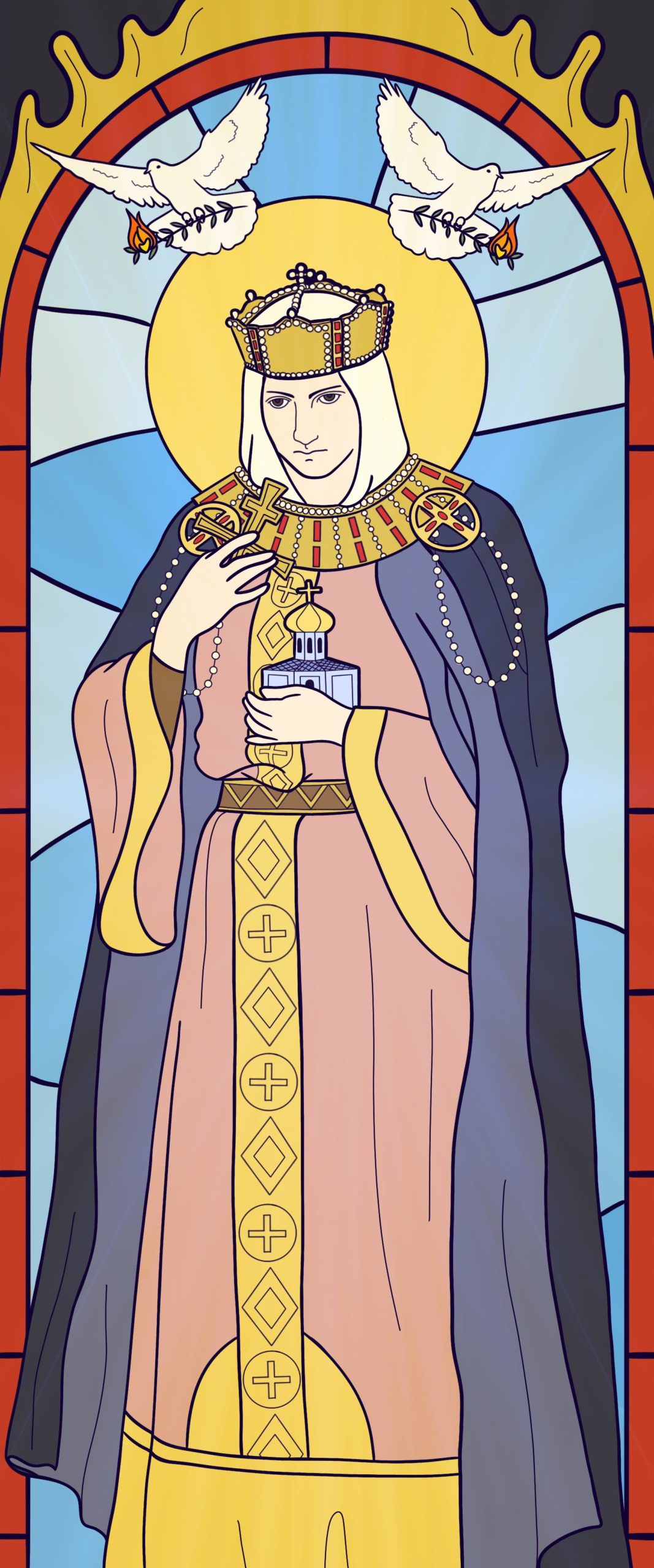By Ryn Williams, Layout Editor
Relations between Russia and Ukraine are as tumultuous as ever, and the threat of war hangs in the air as many sovereign countries sanction Russia for the invasion of Ukraine.
St. Olga of Kyiv–or Kiev–is, for many, a symbol of widowhood, of a strong female leader, and of vengeance. But, for some, she is a symbol of a brutal warlord who found forgiveness in the teachings of Christ. For both Russians and Ukrainians, she is a founding figure.
Dr. Thomas Humphries, an associate professor of philosophy, theology, and religion, was shared some knowledge about St. Olga, a figure who has been brought up recently amid the current invasion from Russia into Ukraine.
The story of St. Olga is a complicated one. While there is not much on her life before her marriage to Prince Igor I of Kyiv, she is an immigrant with pagan Viking roots.
“Whether she’s Saint Olga of Kiev, K-I-E-V, or whether she’s Saint Olga of Kyiv, K-Y-I-V, and the difference here is… how you transliterate those characters, how you pronounce them,” said Humphries. “Kiev (key-ev) is the more Russian pronunciation, and Kyiv (kave) is the more Ukrainian pronunciation.”
“How do you pronounce the name of the city?” asked Humphries. “Is St. Olga a Ukrainian? Does she belong in Kyiv, or is she a Russian saint, was she in Kiev?”
The history of Kyiv-Kiev is a complicated one tracing back hundreds of years. Modern day Belarus, Russia, and parts of Czechoslovakia and Poland were lived in by the Rus’ people, an early medieval group; but the center of that group was in what is now Ukraine.
“They’re pagan, and they’re brutally pagan,” said Humphries. “This is a brutal time.”
Instead of taxes, St. Olga and Prince Igor I were attempting to consolidate by power. They would also protect certain groups if enough money was handed over.
“Olga is a fierce warrior, and she’s also, by most accounts, beautiful. So you have this beautiful and powerful woman who also turns out to be brutal as a tactician in war. Her husband is killed while trying to extract more money from one of those city-state-clan-tribe-groups. Turns out, their army is more powerful now, he didn’t bring enough soldiers with him, so they kill him pretty brutally.”
In the most popular version of the story, the enemy group dismembered Prince Igor I by tying each of his limbs to a different tree and then allowing them to rip him apart. There is a dispute about how St. Olga enacted her vengeance on the people who killed her husband, on whether she buried hundreds alive or sent flaming birds to set their cities on fire.
“That’s an impressive strategy if you want to be a mass murderer,” said Humphries. “And that’s Olga.”
St. Olga, however, eventually embraced Christianity. She lived in the same era of Sts. Cyril and Methodius, two missionary brothers who, according to Humphries, “effectively” invented the Slavonic language in order to translate the Bible.
“In that missionary effort, Olga, towards the end of her life, recognizes that she needs to create a receptive land towards Christianity,” said Humphries. “She invites the Bishop of Constantinople [and the Pope]… to send more missionaries to her land, she builds churches.”
St. Olga hoped to establish a bishop in Kiev that the Church would recognize; this would allow the bishop to have the authority to ordain new bishops and create dioceses.
“It is not accomplished in her lifetime. She fails at it,” said Humphries. “Her own son vehemently goes back to pagan ways.”
On her deathbed, St. Olga lamented that she “built churches which are still empty.”
Her grandson, Volodymyr (Ukrainian) or Vladimir (Russian), the Great, leads the effort that causes Christianity to succeed in the region.
St. Olga’s story is not one of failure but one of hope.
“Is she your patron and your icon because she’s some kind of fierce woman warrior? Maybe so. Is she your icon because despite being a mass murderer, she converts to Christ?” Humphries said. “Honestly, none of us are going to be as devious and powerful as Olga… [but]even she can convert.”
While St. Olga’s patronage is of widows and converts, she represents so much to so many people of both Ukraine and Russia.
“There is a story of hope there,” Humphries concluded. “‘I’ve not been as bad as she is—maybe I, too, can convert?”







